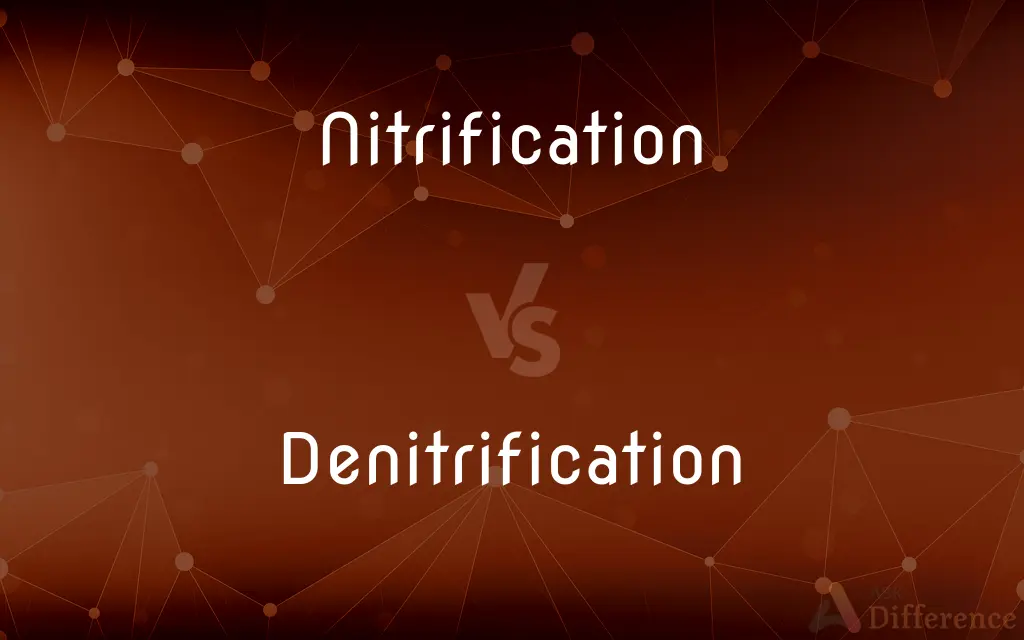Nitrification vs. Denitrification — What's the Difference?
Edited by Tayyaba Rehman — By Fiza Rafique — Updated on September 27, 2023
Nitrification is the biological oxidation of ammonia to nitrate, primarily by bacteria. Denitrification is the reduction of nitrate to nitrogen gas, primarily by bacteria, returning nitrogen to the atmosphere.

Difference Between Nitrification and Denitrification
Table of Contents
ADVERTISEMENT
Key Differences
Nitrification and denitrification are integral processes in the nitrogen cycle of ecosystems. Nitrification involves the conversion of ammonia to nitrate through a two-step biological process. On the other hand, denitrification is a process that reduces nitrate to nitrogen gas, which then escapes into the atmosphere.
The process of nitrification is mainly mediated by two groups of bacteria: ammonia-oxidizing bacteria and nitrite-oxidizing bacteria. In contrast, denitrification is conducted by various bacteria that use nitrate as a terminal electron acceptor in the absence of oxygen, converting it to nitrogen gas.
Nitrification is essential in soil systems to make nitrogen available to plants in the form of nitrates, which plants can easily take up. Denitrification, conversely, is a crucial step in removing excess nitrogen from aquatic systems, preventing eutrophication and maintaining the balance of nitrogen in the atmosphere.
Both nitrification and denitrification are significant from an environmental standpoint. While nitrification can contribute to acidification of soil and water systems, denitrification can help in the mitigation of nitrous oxide, a potent greenhouse gas, from the environment.
Comparison Chart
Process Direction
Oxidation
Reduction
ADVERTISEMENT
Primary Substrate
Ammonia
Nitrate
End Product
Nitrate
Nitrogen gas
Oxygen Requirement
Aerobic (requires oxygen)
Anaerobic (occurs in the absence of oxygen)
Environmental Impact
Can contribute to acidification
Helps mitigate nitrous oxide, a greenhouse gas
Compare with Definitions
Nitrification
The conversion of ammonia into nitrite and then nitrate by bacteria.
The process of nitrification is essential for plants to access nitrogen.
Denitrification
A microbial-led reduction of nitrates in the environment.
In wetlands, denitrification can prevent eutrophication of water bodies.
Nitrification
A biological process involving the oxidation of ammonia.
In aquaponics, nitrification ensures that fish waste is converted into a usable form for plants.
Denitrification
The anaerobic process turning nitrate into nitrogen gas.
In wastewater treatment, denitrification removes harmful nitrogen compounds.
Nitrification
A step in the nitrogen cycle where bacteria transform ammonia.
Healthy soil ecosystems rely on nitrification to provide vital nutrients.
Denitrification
The biological conversion of nitrate to atmospheric nitrogen.
Denitrification is a natural way to remove excess nitrogen from soils.
Nitrification
The two-stage process turning ammonia into nitrate.
Through nitrification, certain bacteria play a crucial role in soil fertility.
Denitrification
The step in the nitrogen cycle that releases nitrogen back to the atmosphere.
Without denitrification, the Earth's nitrogen balance would be disrupted.
Nitrification
Nitrification is the biological oxidation of ammonia to nitrite followed by the oxidation of the nitrite to nitrate occurring through separate organisms or direct ammonia oxidation to nitrate in comammox bacteria. The transformation of ammonia to nitrite is usually the rate limiting step of nitrification.
Denitrification
The process of reducing nitrate to nitrogen gas.
Denitrification helps in balancing atmospheric nitrogen levels.
Nitrification
To oxidize (an ammonia compound) into a nitrite or (a nitrite) into a nitrate, especially by the action of nitrifying bacteria.
Denitrification
Denitrification is a microbially facilitated process where nitrate (NO3−) is reduced and ultimately produces molecular nitrogen (N2) through a series of intermediate gaseous nitrogen oxide products. Facultative anaerobic bacteria perform denitrification as a type of respiration that reduces oxidized forms of nitrogen in response to the oxidation of an electron donor such as organic matter.
Nitrification
To treat or combine with nitrogen or compounds containing nitrogen.
Denitrification
To remove nitrogen or nitrogen groups from (a compound).
Nitrification
The process of nitrifying
Denitrification
To reduce (nitrates or nitrites) to nitrogen-containing gases, as by bacterial action on soil.
Nitrification
The act, process, or result of combining with nitrogen or some of its compounds.
Denitrification
The process by which a nitrate becomes molecular nitrogen, especially by the action of bacteria.
Nitrification
A process of oxidation, in which nitrogenous vegetable and animal matter in the presence of air, moisture, and some basic substances, as lime or alkali carbonate, is converted into nitrates.
Denitrification
The act or process of freeing from nitrogen; also, the condition resulting from the removal of nitrogen.
Nitrification
The chemical process in which a nitro group is added to an organic compound (or substituted for another group in an organic compound)
Nitrification
The oxidation of ammonium compounds in dead organic material into nitrates and nitrites by soil bacteria (making nitrogen available to plants)
Nitrification
The aerobic transformation of ammonia compounds.
Fertilized fields undergo rapid nitrification, providing plants with essential nitrates.
Common Curiosities
How do nitrification and denitrification differ?
Nitrification oxidizes ammonia to nitrate, while denitrification reduces nitrate to nitrogen gas.
What is the purpose of denitrification?
Denitrification converts nitrate to nitrogen gas, returning excess nitrogen to the atmosphere.
Does nitrification require oxygen?
Yes, nitrification is an aerobic process, meaning it requires oxygen.
Which bacteria are involved in nitrification?
Primary bacteria involved in nitrification are ammonia-oxidizing and nitrite-oxidizing bacteria.
Is nitrification beneficial for plants?
Yes, nitrification makes nitrogen available to plants in the form of nitrates, which they can uptake.
What is nitrification?
Nitrification is the biological oxidation of ammonia to nitrate, primarily by bacteria.
Why is denitrification important in wastewater treatment?
Denitrification removes harmful nitrogen compounds from wastewater, preventing them from entering waterways.
Can nitrification lead to soil acidification?
Yes, nitrification can contribute to the acidification of soils and water systems.
Is denitrification an anaerobic process?
Yes, denitrification is anaerobic, taking place in the absence of oxygen.
Do human activities influence denitrification rates?
Yes, human activities like agriculture and wastewater treatment can influence denitrification rates.
Why is denitrification vital in the nitrogen cycle?
Denitrification returns nitrogen from the terrestrial ecosystem back to the atmosphere, completing the nitrogen cycle.
How does denitrification impact global warming?
Denitrification can mitigate nitrous oxide, a potent greenhouse gas, from the environment.
Does nitrification produce nitrous oxide?
Nitrification can produce nitrous oxide as an intermediate or side product, which is a greenhouse gas.
Can denitrification occur in waterlogged soils?
Yes, denitrification is more prevalent in waterlogged soils due to the anaerobic conditions.
Is nitrification a natural process?
Yes, nitrification is a natural biological process mediated by specific bacteria.
Share Your Discovery

Previous Comparison
Coupling vs. Union
Next Comparison
Barberry vs. BerberineAuthor Spotlight
Written by
Fiza RafiqueFiza Rafique is a skilled content writer at AskDifference.com, where she meticulously refines and enhances written pieces. Drawing from her vast editorial expertise, Fiza ensures clarity, accuracy, and precision in every article. Passionate about language, she continually seeks to elevate the quality of content for readers worldwide.
Edited by
Tayyaba RehmanTayyaba Rehman is a distinguished writer, currently serving as a primary contributor to askdifference.com. As a researcher in semantics and etymology, Tayyaba's passion for the complexity of languages and their distinctions has found a perfect home on the platform. Tayyaba delves into the intricacies of language, distinguishing between commonly confused words and phrases, thereby providing clarity for readers worldwide.
















































